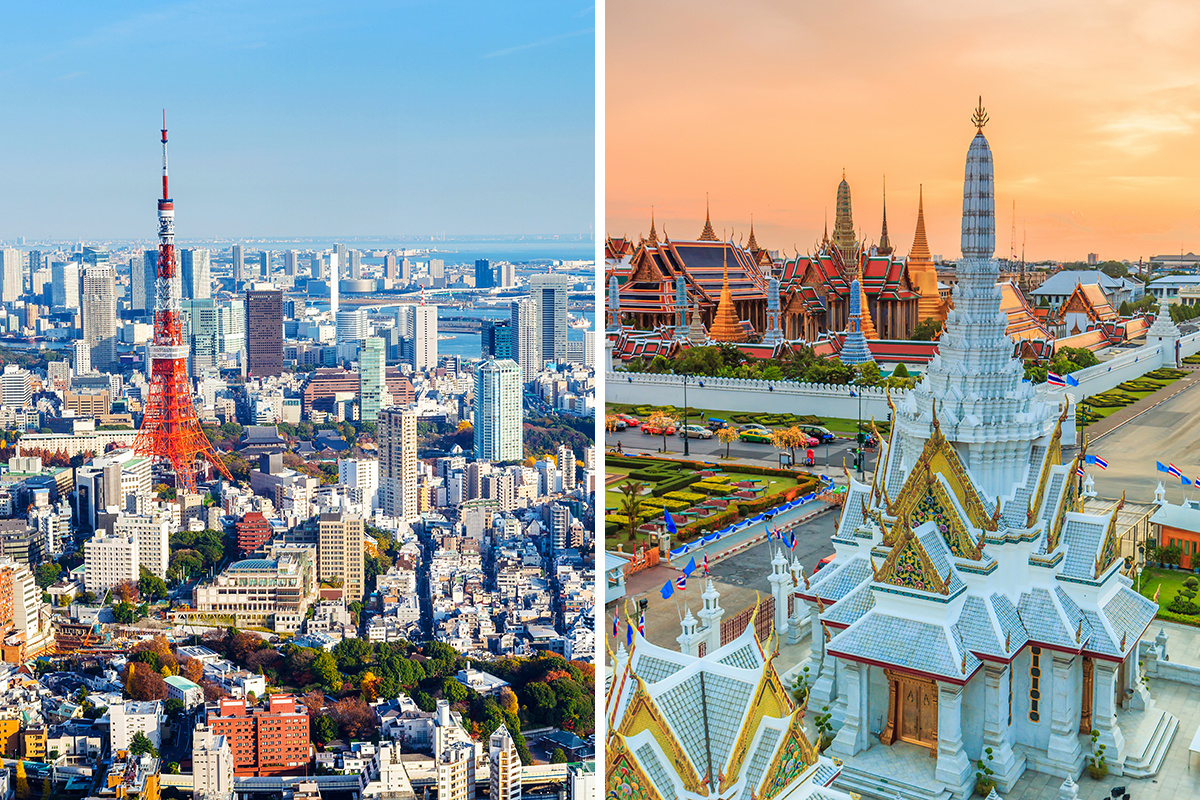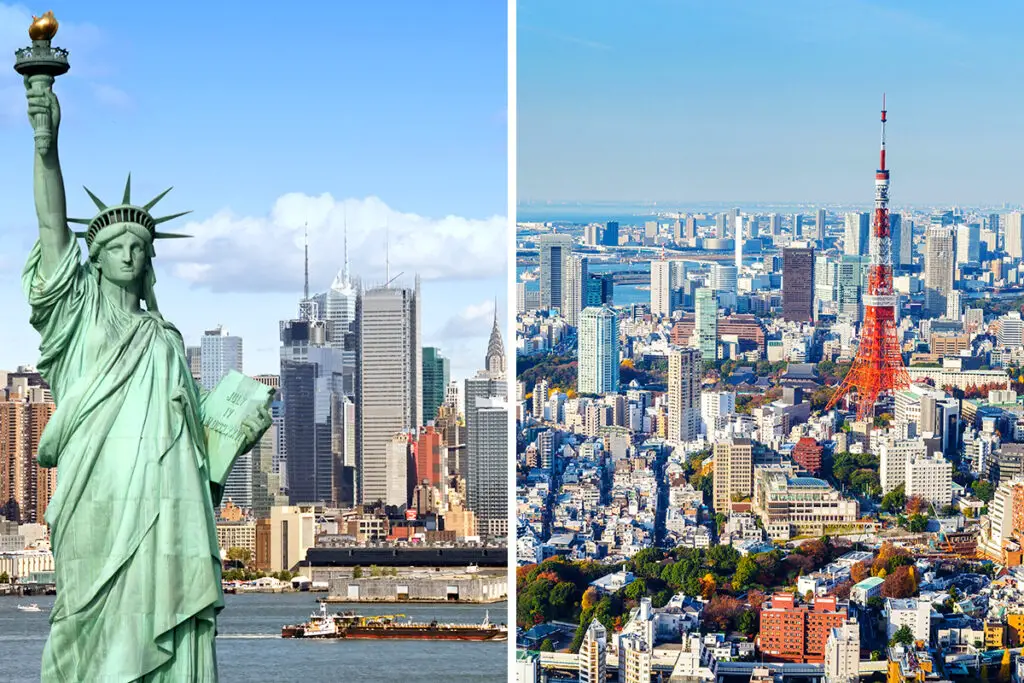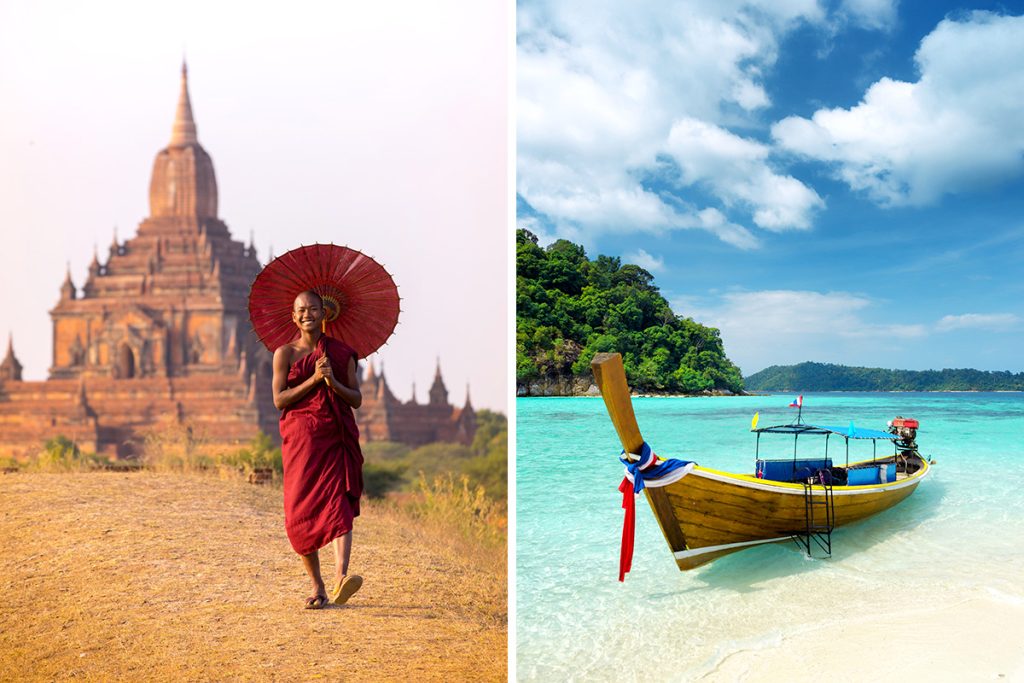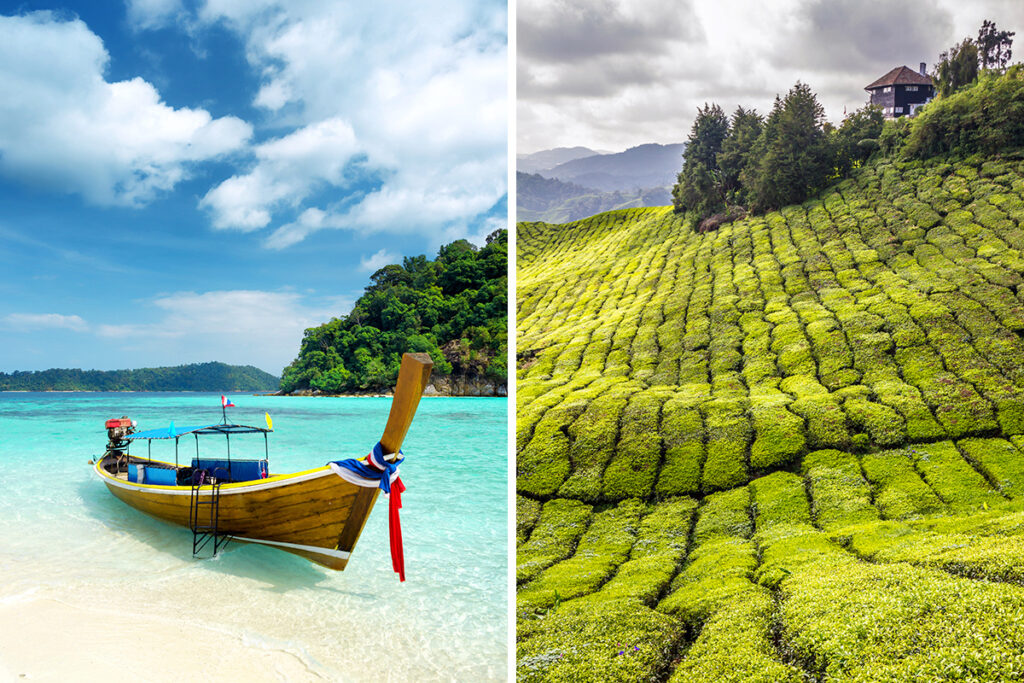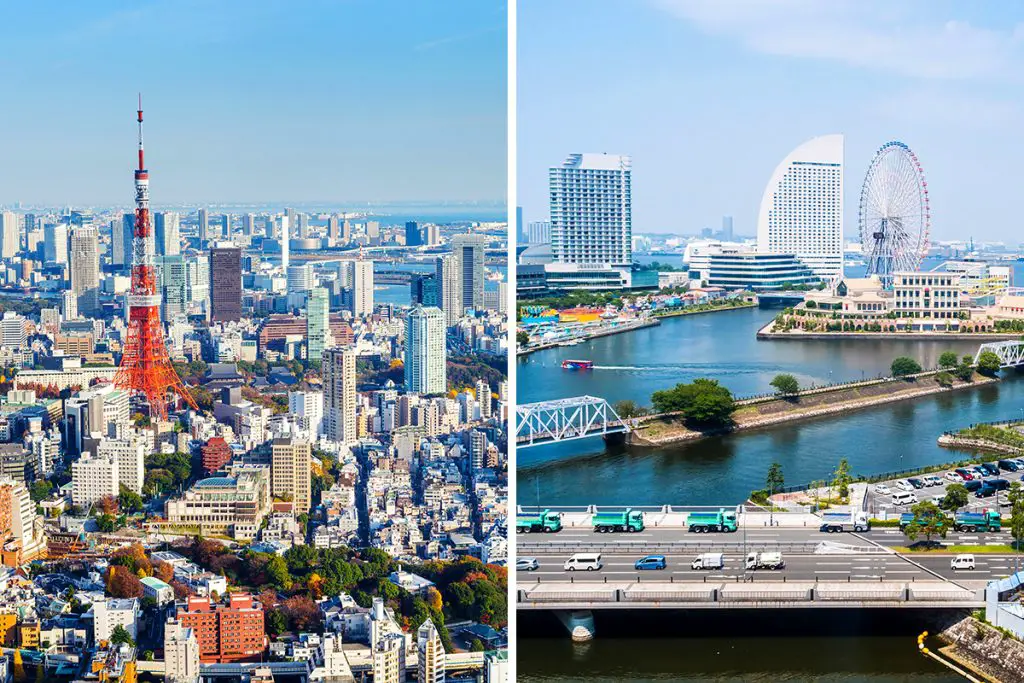Ah, the age-old question: Tokyo or Bangkok? Each city holds its unique allure. Whether it’s the seamless blend of modern and traditional in Tokyo or the vibrant street life in Bangkok, you’re bound for an unforgettable experience. Curious to dig deeper and find out which destination suits you best? Read on.
History & Culture
Before diving into the wonders of Tokyo and Bangkok, it’s essential to have a bird’s-eye view of their rich history and culture. Both cities are like living museums, offering glimpses of past eras even as they rocket into the future.
Tokyo, once a humble fishing village named Edo, blossomed into Japan’s political and cultural hub. Its history is a rich tapestry of samurai traditions, Edo-period art, and cutting-edge technology.
The city effortlessly fuses the ancient and the modern, giving you a taste of feudal Japan alongside robot restaurants. Imagine walking among skyscrapers and then stumbling upon a quiet Shinto shrine, where you can soak up serenity.
On the other side, Bangkok, the capital city of Thailand, also has roots stretching back centuries. It evolved from a small trading post to a city known for its royal palaces and Buddhist temples. Spirituality is an integral part of daily life here; you’ll often see orange-robed monks collecting alms in the early morning.
While Tokyo leans more toward technological advancements, Bangkok embraces a more laid-back atmosphere infused with spirituality.
In Tokyo, the emphasis on preserving history is apparent in how the city’s layout accommodates both skyscrapers and shrines. Cultural practices like tea ceremonies and Ikebana (flower arranging) are revered and widely practiced. It’s a place where the ancient customs of the samurai coexist with the youth culture of Harajuku.
In contrast, Bangkok is a bustling hub of various Southeast Asian cultures. From its ornate shrines to the traditional dances, the Thai capital reveres its customs and ancient practices. Spirit houses are a common sight, and folklore plays a significant role in the culture, with events like the annual Songkran water festival offering a glimpse into age-old traditions.
So, if you’re drawn to the avant-garde mixed with historical depth, Tokyo might be your match. But if a more spiritual and relaxed environment sparks your interest, then Bangkok offers its own unique richness. Both cities promise a captivating experience, steeped in a culture and history that’s unlike anything else.
Attractions & Activities
When you think of a trip filled with astonishing attractions and engaging activities, both Tokyo and Bangkok come to mind. The trick is figuring out which city offers experiences that resonate more with your interests. Let’s dive into what each destination has up its sleeve.
In Tokyo, a must-visit is the Meiji Shrine, a tranquil oasis in the middle of the bustling city. Take a leisure stroll through the wooded paths and breathe in the natural beauty.
Then, for a thrilling adventure, you might want to experience the high-speed trains. Riding the Shinkansen, also known as the “Bullet Train,” offers a blend of efficiency and excitement as it races at speeds up to 200 mph (321.87 kph).
Over in Bangkok, if you’re a fan of architectural splendor, the Grand Palace is a jaw-dropping site you won’t want to miss. Comprising numerous buildings, halls, and pavilions set around courtyards, you’ll be fascinated by the intricacies of Thai craftsmanship.
For those drawn to the natural world, a boat tour of the Chao Phraya River gives you the chance to witness daily life along Bangkok’s waterways, complete with traditional wooden houses on stilts.
Tokyo’s Akihabara district is heaven for tech-savvy individuals and fans of Japanese pop culture. Dive into shops filled with electronic gadgets and anime merchandise, but remember, this isn’t a shopping spree; it’s a cultural phenomenon!
Meanwhile, for outdoor enthusiasts, hiking up Mt. Takao offers panoramic views of Tokyo and is particularly stunning during the cherry blossom season.
In Bangkok, a trip to Wat Arun, or the Temple of Dawn, offers a different kind of elevation. The temple has a steep stairway that leads to breathtaking views of the river and the city. The experience feels spiritual and invigorating all at once.
To summarize, Tokyo pulls you in with its technological marvels and awe-inspiring natural sites. On the other hand, Bangkok captivates with its magnificent palaces and a much closer connection to the river that threads through the city. Your choice between Tokyo and Bangkok ultimately hinges on what kind of activities and attractions call out to you.
Eating, Drinking & Nightlife
When it comes to gastronomic delights, refreshing drinks, and vibrant nightlife, both Tokyo and Bangkok have their unique offerings. The question is, what’s your flavor? Here’s how the two cities stack up.
Tokyo takes you on a culinary journey unlike any other. From sushi bars to ramen joints, the city’s eateries offer an array of traditional Japanese dishes. The freshness of the fish in sushi and the depth of flavors in ramen bowls are simply unparalleled.
Bangkok is a paradise for foodies, too. Street food stalls serve up local favorites like Pad Thai and Som Tum (papaya salad). The variety is astonishing, and the spices will awaken every taste bud.
When it comes to drinking, Tokyo introduces you to the world of sake and Japanese whiskey. Izakayas, or Japanese pubs, offer these local brews in a cozy setting. Whether it’s a hot sake in winter or a refreshing highball in summer, Tokyo gives you a warm, communal drinking experience.
In Bangkok, you’ll find a completely different but equally exciting drinks scene. From tropical cocktails to local beer like Singha, the choices are endless. The city’s sky bars offer panoramic views along with your favorite drinks, adding an extra layer of enjoyment.
As for nightlife, Tokyo dazzles with its neon lights and late-night anime cafes. You can even experience traditional Geisha performances in some districts. However, it’s not all about clubs and loud music; it’s an eclectic mix that appeals to various interests.
Bangkok, on the other hand, is known for its rooftop lounges and riverside clubs. Music genres range from electronic to traditional Thai, and the energy is always high.
In summary, whether you’re a foodie, a drink connoisseur, or a night owl, both Tokyo and Bangkok have something to offer. Tokyo leans more towards traditional experiences, while Bangkok offers a laid-back yet lively atmosphere.
Shopping
Ah, shopping—a delightful experience that’s a blend of culture and pleasure. But where should you go for that ultimate retail therapy: Tokyo or Bangkok?
Tokyo is a shopaholic’s dream when it comes to electronics and high-fashion brands. Areas like Ginza and Shibuya offer high-end retailers like Gucci and Chanel. Akihabara, the “Electric Town,” is the go-to place for cutting-edge gadgets and computer components.
And if you’re a fan of Japanese comics, there’s no better place than Nakano Broadway, filled with stores offering manga and collectibles.
Bangkok is a haven for those who love handmade crafts, souvenirs, and affordable fashion. The Chatuchak Weekend Market is one of the world’s largest open-air markets, offering everything from vintage clothing to antique furniture. If you’re into jewelry, the Gem and Jewelry district is where you’ll find stunning yet affordable pieces.
Both cities offer unique takes on fashion. While Tokyo is known for its quirky Harajuku style, Bangkok is the epitome of tropical casual. You’ll find plenty of light, breathable fabrics in colorful patterns in Bangkok, whereas Tokyo offers more structured and eclectic fashion statements.
For a luxurious shopping experience, Tokyo’s Omotesando Hills offers several floors of designer brands and even art galleries. Bangkok’s equivalent would be the Siam Paragon, where you can shop for high-end fashion and even cars!
In summary, Tokyo offers cutting-edge electronics and high-fashion brands while Bangkok shines in handcrafted goods and affordable fashion. The choice between Tokyo and Bangkok for shopping depends on what you’re looking to add to your collection.
Accommodation
Finding the right place to stay can make or break your travel experience. Tokyo and Bangkok offer a wide array of accommodation options to suit every taste and budget. Let’s find out which city matches your lodging needs.
Tokyo gives you the full spectrum of options, from ultra-luxurious hotels in districts like Shinjuku and Roppongi to budget-friendly capsule hotels. If you’re into unique experiences, you might want to try a traditional Ryokan where you sleep on tatami mats. These places often offer hot spring baths and traditional Japanese meals as part of the package.
Bangkok also provides diverse accommodation options. Riverside hotels offer stunning views and are close to several major attractions. For budget travelers, Khao San Road is the backpackers’ paradise where you can find affordable hostels and guesthouses.
While both cities are relatively safe, Tokyo has a reputation for being one of the safest cities in the world. Hotels and other accommodations often have high standards of cleanliness and service.
In Bangkok, it’s advisable to stay in well-known areas or hotels with good reviews to ensure safety and quality service. But once you’ve found the right spot, Thai hospitality is sure to win you over.
In summary, both Tokyo and Bangkok offer a wide range of accommodations. Tokyo leans more toward traditional and luxurious experiences while Bangkok offers a blend of modern comfort and budget-friendly options. Your choice will depend on your preferences and budget.
Family-Friendliness & Children’s Activities
Traveling with family? Both Tokyo and Bangkok offer a treasure trove of activities that are perfect for children and parents alike. Let’s delve into what each city has to offer.
Tokyo Disneyland and DisneySea are big hits for families. With their themed rides and parades, these parks are where your children’s favorite characters come to life. Another family-friendly spot is the Ueno Zoo, which has pandas and elephants that kids adore.
In Bangkok, you can take your family to the Safari World. Here, you can drive through a safari park and get up close to animals like lions and zebras. For a more educational experience, the Children’s Discovery Museum offers interactive exhibits that are both fun and informative.
Tokyo is also well-known for its children’s museums and science exhibits, such as the National Museum of Nature and Science, which are both educational and entertaining. You’ll find various interactive exhibits that help kids understand the world around them.
Bangkok has some water parks like Siam Park City, where both kids and adults can cool off and enjoy a range of water slides and rides. This park even includes a wave pool and a lazy river, perfect for a family day out.
In summary, Tokyo and Bangkok both offer family-friendly environments but in different flavors. Tokyo leans towards educational and magical experiences, while Bangkok offers more natural and outdoor adventures.
Getting There & Getting Around
When planning a trip, knowing how to get to your destination and how to get around once you’re there is crucial. So, how do Tokyo and Bangkok stack up in this department?
Getting to Tokyo usually involves flying into either Narita International Airport or Haneda Airport. Narita is around 37 miles (about 60 km) from central Tokyo, and Haneda is closer, at about 11 miles (roughly 18 km).
Bangkok’s main international airport is Suvarnabhumi, which is about 19 miles (30 km) from the city center. Another option is Don Mueang Airport, mainly for budget airlines, located around 13 miles (21 km) from downtown.
Once you’re in Tokyo, the train system is highly efficient. The Tokyo Metro and JR lines can get you almost anywhere in the city, and they run like clockwork. Taxis are also available but can be pricey.
In Bangkok, the Skytrain (BTS) and underground (MRT) are good options for getting around the city. Tuk-tuks and taxis are also popular, though it’s good to negotiate the fare in advance.
In summary, both Tokyo and Bangkok have well-connected international airports and reliable public transportation. Tokyo’s system is more structured and can be a bit expensive, while Bangkok offers a more laid-back and negotiable transport environment. Your choice will depend on your comfort and familiarity with urban navigation.
Weather
When it comes to travel, weather can be a game-changer. Tokyo and Bangkok offer vastly different climates, which can deeply influence your experience. Let’s explore the weather patterns of these two fascinating cities.
Tokyo experiences all four seasons distinctly. Spring (March to May) is lovely, with cherry blossoms painting the town pink.
Summers (June to August) can be hot and humid, with temperatures reaching up to 86°F (30°C). Fall (September to November) brings mild weather and vibrant foliage, while winters (December to February) are cold but not harsh, averaging around 41°F (5°C).
Bangkok, on the other hand, is hot and humid year-round. It has a tropical climate, so you’ll mostly deal with three seasons: hot, rainy, and cool.
The hot season runs from March to June with temperatures often soaring past 95°F (35°C). The rainy season follows, lasting from July to October. The cooler months, from November to February, offer more comfortable weather, averaging around 79°F (26°C).
In Tokyo, you might need different types of clothing depending on the season you visit. But in Bangkok, light, breathable fabrics will serve you well any time of the year.
If you love snowy landscapes, Tokyo’s winter could be an unforgettable experience. On the flip side, if you’re a sun-seeker, Bangkok’s warm weather will likely be more up your alley.
To sum it up, Tokyo offers a range of weather experiences depending on the season, while Bangkok provides a consistently warm and tropical climate. Your preference for weather can significantly influence which city is a better match for your travel needs.
Safety
Safety is a crucial factor when choosing a travel destination. Both Tokyo and Bangkok have their own safety records and unique challenges, so let’s delve into the specifics.
Tokyo is often cited as one of the safest cities in the world. Violent crime is rare, and even petty crime like pickpocketing is not common. The city’s cleanliness and orderliness add to the overall feeling of safety.
Bangkok is generally safe for tourists, especially in well-traveled areas. However, petty crimes like pickpocketing can occur, particularly in crowded places or tourist hotspots. Always be cautious and keep an eye on your belongings.
Unique to Tokyo, earthquakes are a part of life. Buildings and infrastructure are designed to be earthquake-resistant, but it’s a good idea to familiarize yourself with earthquake safety tips. In Bangkok, flooding can occur during the rainy season, so staying informed about weather conditions is wise.
In summary, Tokyo scores high in general safety, while Bangkok is generally safe but requires a bit more caution. Natural events like earthquakes in Tokyo and flooding in Bangkok add another layer to consider when evaluating safety.
Cost
Budgeting for a trip is essential, and the cost of food, lodging, and transportation can vary widely between Tokyo and Bangkok. Let’s break down the costs you can expect in each city.
Tokyo is one of the most expensive cities in the world. A decent hotel room might cost you around 375 USD. Meals can range from 1,000 JPY (around 7 USD) to 6,000 JPY (around 41 USD) per person, depending on where you eat.
Public transportation, while efficient, can add up, costing around 1,500 JPY (around 10.50 USD) for a day’s worth of travel; with a day pass, you can slash that by half.
Bangkok is far more budget-friendly. A midrange hotel room can average around 150 USD. Food is also less expensive, with street food and local meals costing around 50 THB (around 1.50 USD) to 100 THB (around 3 USD). Public transport is not only cheap but also offers variety; a day’s travel might cost you around 100 THB (around 3 USD).
While Tokyo offers a luxurious but expensive experience, Bangkok lets you enjoy a rich travel experience without breaking the bank. In summary, Tokyo is significantly more costly in every aspect, from accommodation to food and transport, whereas Bangkok offers a more economical option without compromising on quality.
Which Is Better – Tokyo or Bangkok?
As we reach the finale of our deep dive into the two mesmerizing cities of Tokyo and Bangkok, it’s time to consolidate what we’ve learned across a range of factors. From history and culture to cost and weather, each city has its own set of merits and drawbacks. Here’s a rundown to help you make an informed decision on which destination is right for you.
In terms of history and culture, Tokyo offers a unique blend of ancient traditions and cutting-edge innovation. Its diverse seasons also offer varying experiences from cherry blossoms to snowy landscapes. Bangkok, on the other hand, keeps you warm year-round and provides a rich tapestry of Thai culture.
If you want a mix of old and new or varied weather, Tokyo calls your name. If you seek a consistently tropical environment imbued with rich cultural heritage, Bangkok is your go-to.
When discussing attractions and activities, Tokyo boasts world-renowned temples, gardens, and fascinating neighborhoods. Bangkok isn’t far behind with its grand palaces, intricate shrines, and bustling markets.
If you prefer a more modern and organized ambiance, Tokyo would be more up your alley. But if you’re looking for a more raw and authentic local experience, Bangkok is unbeatable.
As far as beaches are concerned, neither city is particularly famous for them, but if this is a priority, Tokyo offers coastal regions within a day’s trip. Bangkok would require a more extended journey to coastal areas like Phuket or Koh Samui. If you can spare the extra travel time, Bangkok’s nearby beaches are generally more stunning.
On the subject of eating, drinking, and nightlife, Tokyo offers a refined culinary experience and a wide array of bars and clubs. Bangkok, on the other hand, offers street food galore and a nightlife that is a bit more rowdy. Depending on your preference for sophistication or earthiness, either city can meet your needs.
When shopping, Tokyo is known for its high-end boutiques and tech shops, whereas Bangkok is the haven for budget-friendly shopping, from street markets to malls. In the matter of accommodation, Tokyo is generally more expensive, offering high-end luxury, while Bangkok offers a range of affordable options without sacrificing comfort.
Lastly, getting to either city is relatively easy with well-connected international airports, but getting around is more straightforward in Tokyo with its efficient public transportation system. Bangkok, although cheaper, can be a bit more chaotic in terms of local transport.
To sum it all up, if you’re looking for a more organized, high-tech, and multifaceted experience, Tokyo is your best bet. But if you want a colorful, budget-friendly, and culturally rich adventure, set your sights on Bangkok. Each city offers a world of experiences that are as diverse as they are unforgettable.

